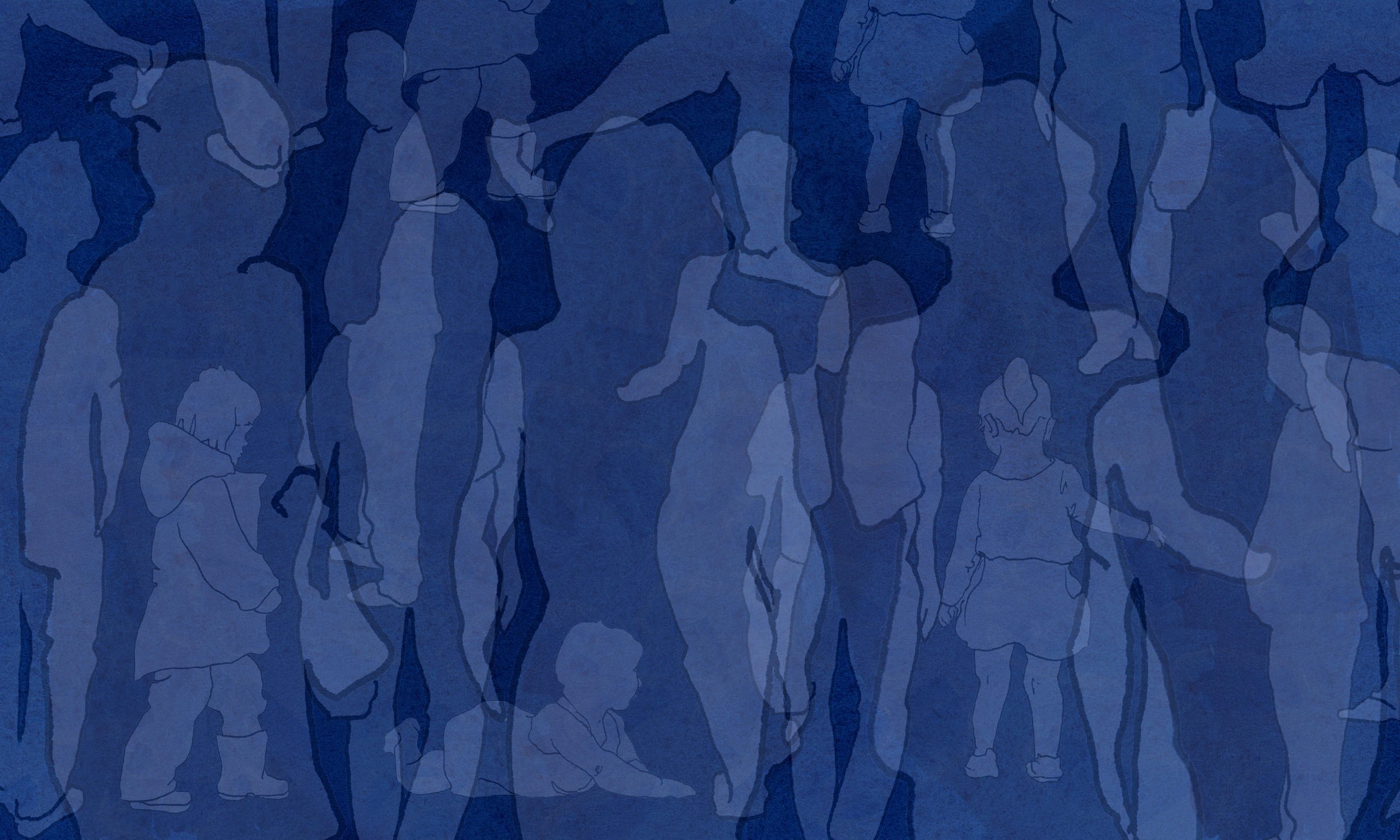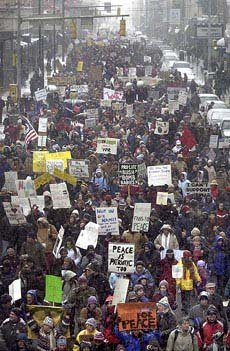Who has the power to send us to war?
Image by Levi Meir Clancy (Unsplash)
Stop the Iraq War protest in London, 2002. Photo: William M. Connolley on en.wikipedia
So many of us are at brainspace capacity with the thousand daily tabs of adulting… the tasks of the day ahead, our jobs, our kids, our families, everyone’s health. We worry about our budgets among rising interest rates and cost of living. We worry about damage to our climate and whether we’re doing enough to turn things around. We worry about soccer practice and what’s for dinner.
But there’s a lot, frankly, that most of us would prefer to largely outsource to experts and elected officials as we try our best to stay informed, stay sane and make decisions about our lives.
So I find myself unnerved right now that a cohort of sober senior military strategists are asking people like me to look up, and pay attention to a question I would rather push far, far away onto someone else’s plate.
Namely, what happens in Australia if the US goes to war with China?
In case you missed it, the ABC has been interviewing some of Australia’s most experienced military strategists for its recent article series, “What would war with China look like for Australia: Part 1 and Part 2”.
These experts warn Australia could be ‘sleep-walking’ into war. They say one day we could wake up to the news that a line has been crossed over Taiwan, America is looking for allies and our leaders have once again signed us up to go all the way with Uncle Sam.
They’re suggesting we urgently stir up a bit of public debate about just who has the power to make that decision on our behalf: the Prime Minister and Cabinet? Parliament? A referendum of the people?
Now, like most people I find the mere thought of surviving a global pandemic only to enter into a global war too horrid to deeply contemplate. But a war involving nuclear-armed superpowers would certainly impact us all, whether we feel inclined to contemplate it or not.
Rally to end the war in Iraq. Image: DianeM677
So now what?
What can we ‘ordinary people’ possibly do, especially knowing things like public protests have been ignored in the past (remember Iraq)?
Last year, my organisation Australia reMADE convened some informal gatherings of peace experts, to come up with a few starting points for those concerned about all this, which I’ll draw on briefly here.
Image by Levi Meir Clancy (Unsplash)
First of all, we can keep stating the bloody obvious that no one in their right mind wants war. We can loudly reject any hawkish narrative that war is somehow inevitable, a sign of strength, or that it represents anything other than a colossal failure of diplomacy and statesmanship, in all but the most extreme circumstances. We can amplify the voices of people from very different walks of life who know this, and who’ve experienced war firsthand. This is not what success looks like.
Two: we can demand loudly that the Australian people have a say, through a vote by their elected representatives in a joint sitting of Parliament, or even a snap referendum, before our country commits its citizens and soldiers to a conflict abroad. Impractical? It’s happened before: Australia had two conscription referendums (1916 and 1917) during the First World War. And despite overwhelming media and government pro-campaigns, the people voted against conscription both times. Why not extend this principle to the question of war itself?
Finally, we can be vocal in our agreement that we expect our country’s leaders to speak and lead in ways that de-escalate the risk of conflict, and to invest in policies and relationships that build the infrastructure of peace, security and public good at home and abroad.
Like the majority of voters, I am heartened by changes in national leadership here and in the US. We’ve come a long way in Australia from just a few short months ago, when the political weaponisation of our national security and manoeuvres for a ‘khaki election’ were making headlines.
Image by Zaur Ibrahimov (Unsplash)
But it will still be incredibly difficult for Prime Minister Anthony Albanese to chart a different course for Australia should the US come asking for our support. If past behaviour is any indication, Opposition Leader Peter Dutton will be all too keen to use the drums of war to try to beat a path back into power for himself. And while we really never want to go to war, we certainly don’t want to do it to score political points.
So we have work to do publicly, to supplement and strengthen the work being done privately, to steer us towards a more hopeful course.
Which brings me to my last request. In research we did a few years back, Australia reMADE found that Australians overwhelmingly want our country to be a ‘proud contributor to a just world’; to be known and respected as a strong and smart force for peace and justice — in the way that Doc Evatt, Australia’s first Minister for External Affairs and contributor to the development of the UN, was known. It’s a noble aim, but we have to educate ourselves.
We tend to idolise our war heroes, and rightly honour our veterans and their families for the sacrifices they make. There is little equivalent attention and homage paid to the architects and humble servants of peace. We have no National Peace Museum in Canberra with a multi-million dollar budget. Few Australians would know how instrumental our nation was in setting up the International Campaign to Abolish Nuclear weapons (which won the Nobel Peace Prize), or the Charter of the United Nations.
So what does the infrastructure of peace look like? Are our leaders doing everything possible to pave a path to greater peace, justice and public good? Who are our ‘peace heroes’? Who benefits, financially or otherwise, from a culture of war, and do they have too much purchase? I would like our media to ask these questions and tell these stories more often. I would like all of us to ask these questions more often.
Because as much as we might like to — and as awkward and unqualified as any of us ‘regular people’ feel trying to talk about this stuff — we can’t afford to just outsource questions of war and peace and hope for the best.
It’s time to look up.
LILIAN SPENCER
Lilian Spencer is the Co-Director of Australia reMADE. She believes that the secret to change is to, ‘focus your energy not on fighting the old, but on building the new.’
Selected Other blogs by LILY:
If a tree falls in your front yard, who comes to clean it up?
What is our why? Reclaiming our sense of purpose as a country







